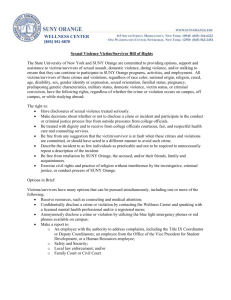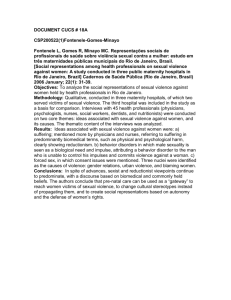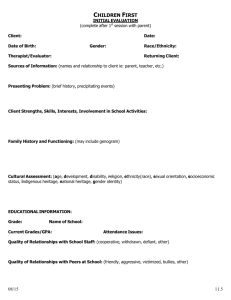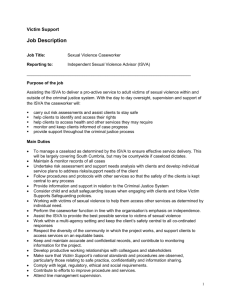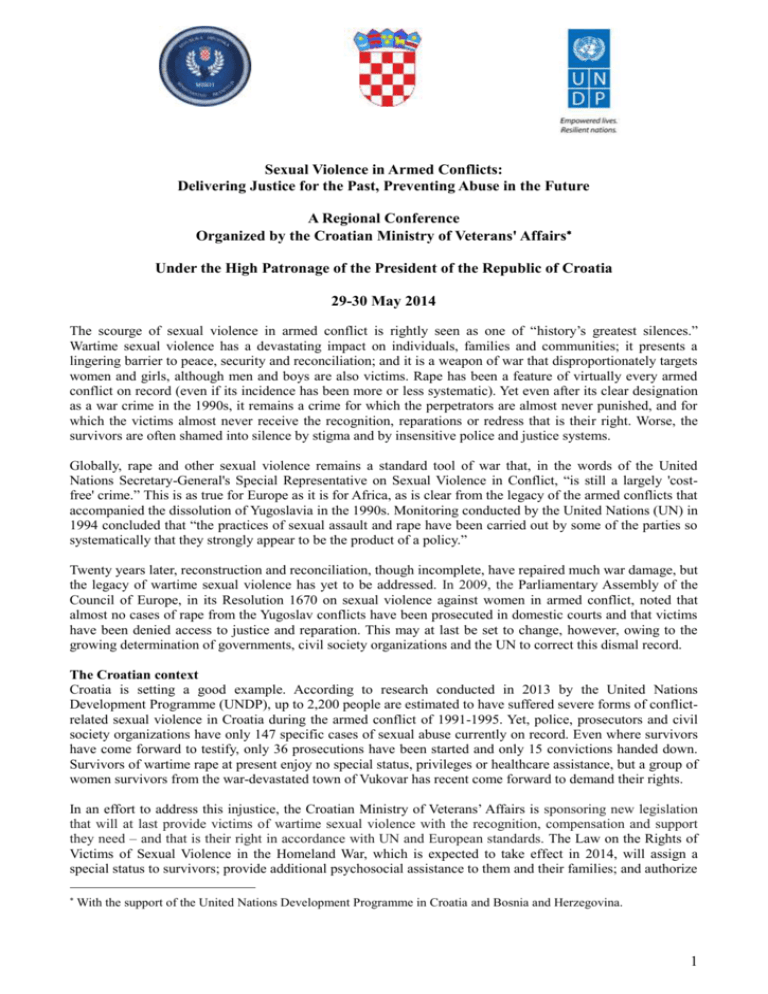
Sexual Violence in Armed Conflicts:
Delivering Justice for the Past, Preventing Abuse in the Future
A Regional Conference
Organized by the Croatian Ministry of Veterans' Affairs
Under the High Patronage of the President of the Republic of Croatia
29-30 May 2014
The scourge of sexual violence in armed conflict is rightly seen as one of “history’s greatest silences.”
Wartime sexual violence has a devastating impact on individuals, families and communities; it presents a
lingering barrier to peace, security and reconciliation; and it is a weapon of war that disproportionately targets
women and girls, although men and boys are also victims. Rape has been a feature of virtually every armed
conflict on record (even if its incidence has been more or less systematic). Yet even after its clear designation
as a war crime in the 1990s, it remains a crime for which the perpetrators are almost never punished, and for
which the victims almost never receive the recognition, reparations or redress that is their right. Worse, the
survivors are often shamed into silence by stigma and by insensitive police and justice systems.
Globally, rape and other sexual violence remains a standard tool of war that, in the words of the United
Nations Secretary-General's Special Representative on Sexual Violence in Conflict, “is still a largely 'costfree' crime.” This is as true for Europe as it is for Africa, as is clear from the legacy of the armed conflicts that
accompanied the dissolution of Yugoslavia in the 1990s. Monitoring conducted by the United Nations (UN) in
1994 concluded that “the practices of sexual assault and rape have been carried out by some of the parties so
systematically that they strongly appear to be the product of a policy.”
Twenty years later, reconstruction and reconciliation, though incomplete, have repaired much war damage, but
the legacy of wartime sexual violence has yet to be addressed. In 2009, the Parliamentary Assembly of the
Council of Europe, in its Resolution 1670 on sexual violence against women in armed conflict, noted that
almost no cases of rape from the Yugoslav conflicts have been prosecuted in domestic courts and that victims
have been denied access to justice and reparation. This may at last be set to change, however, owing to the
growing determination of governments, civil society organizations and the UN to correct this dismal record.
The Croatian context
Croatia is setting a good example. According to research conducted in 2013 by the United Nations
Development Programme (UNDP), up to 2,200 people are estimated to have suffered severe forms of conflictrelated sexual violence in Croatia during the armed conflict of 1991-1995. Yet, police, prosecutors and civil
society organizations have only 147 specific cases of sexual abuse currently on record. Even where survivors
have come forward to testify, only 36 prosecutions have been started and only 15 convictions handed down.
Survivors of wartime rape at present enjoy no special status, privileges or healthcare assistance, but a group of
women survivors from the war-devastated town of Vukovar has recent come forward to demand their rights.
In an effort to address this injustice, the Croatian Ministry of Veterans’ Affairs is sponsoring new legislation
that will at last provide victims of wartime sexual violence with the recognition, compensation and support
they need – and that is their right in accordance with UN and European standards. The Law on the Rights of
Victims of Sexual Violence in the Homeland War, which is expected to take effect in 2014, will assign a
special status to survivors; provide additional psychosocial assistance to them and their families; and authorize
With the support of the United Nations Development Programme in Croatia and Bosnia and Herzegovina.
1
financial reparations for the horrific abuse they have suffered. The goal of the law is to overcome the isolation
and neglect that survivors have experienced, help re-integrate them into society and restore their confidence in
the system, while also reshaping social perceptions to ease the stigma and indifference they face. Notably, the
law covers all survivors of sexual violence, regardless of gender, ethnicity, religion or nationality.
The region and the world
Other governments in Southeast Europe have also instituted legal provisions to create a special status and
establish specific benefits for victims of sexual violence. The work under way in Southeast Europe – however
incomplete – can provide valuable lessons for other countries and regions striving to prevent wartime sexual
violence and address its consequences. Indeed, the international context is shaped now by a rising
determination among leaders, activists and the public to put an end to the impunity that perpetrators so often
enjoy and to ensure that victims are guaranteed their rights.
Over the past two decades, the UN and European Union (EU) have established a strong legal framework and
set clear standards for this work. The UN International Criminal Tribunals for former Yugoslavia and Rwanda
established the jurisprudence to treat rape and sexual violence as war crimes, and this precedent was embraced
by the International Criminal Court created in 1998. UN Security Council resolution 1820, adopted in 2008,
classifies sexual violence as a “tactic of war” and demands the “immediate and complete cessation by all
parties to armed conflict of all acts of sexual violence against civilians.” Successive Security Council
resolutions have called for more effective prosecution of conflict-related sexual violence; systematic
monitoring; and more significant participation by women in bodies charged with security and conflict
resolution. In 2010, the UN Secretary-General added urgency to these efforts by establishing the post of
Special Representative on Sexual Violence in Conflict. These efforts have galvanized world leaders: in 2013,
122 countries signed a UN-sponsored Declaration of Commitment to End Sexual Violence in Conflict.
Whether these commitments can be translated into a safer world for civilians in conflict situations is an open
question. But it is clear that more can be done – and done now – to address the rights and improve the lives of
those who were victims of rape and other sexual violence in during the conflicts of the 1990s.
The conference
The time is thus ripe for a conference that gives voice to the survivors of sexual violence in Southeast Europe
and examines the policies and practices that are best designed to address the injustices of the past.
To this end, and to share lessons learned in Southeast Europe, the Croatian Ministry of Veterans’ Affairs is
leading the organization of a regional conference: “Sexual Violence in Armed Conflict: Delivering Justice
for the Past, Preventing Abuse in the Future” to be held in Zagreb on 29-30 May 2014.
The main aims of the conference are to:
rally governments and the general public across Southeast Europe to address the plight of victims of
sexual violence in armed conflict;
promote a holistic approach to victims’ rights and needs, which extends recognition, support and
reparations without requiring a court verdict or subjecting victims to re-traumatization;
discuss the scale, nature and sources of funding for reparations;
identify and share good practices in addressing the needs of victims; and
identify lessons learnt from Southeast Europe to be shared at the upcoming Summit on the
Prevention of Sexual Violence in Armed Conflicts and disseminated globally through UN networks.
The first day of the conference will be devoted to the international context and national policies and practices
in addressing sexual violence in conflict in Southeast Europe. The second day will focus on the issues of
reparations and rehabilitation. The conference will conclude with an attempt to distill the region's experience
into joint conclusions that will be shared in London on 10-13 June 2014 at the Global Summit of the UK
Prevention of Sexual Violence Initiative. Throughout the conference, participants will view filmed testimony
from the survivors themselves about their needs, their expectations, and their hopes for the future.
2
Sexual Violence in Armed Conflict:
Delivering Justice for the Past, Preventing Abuses in the Future
Gliptoteka – Croatian Academy of Science and Arts
Medvedgradska 2, Zagreb
Draft Agenda
Day 1 - 29 May 2014
8:30 – 9:00
REGISTRATION OF PARTICIPANTS
9:00 – 9:30
OPENING REMARKS
Predrag Matić - Minister of Veterans' Affairs, Croatia
Louisa Vinton - UNDP Resident Representative in Croatia and the FYR of Macedonia
Vesna Pusić - Deputy Prime Minister/Minister of Foreign and European Affairs, Croatia
Josip Leko – Speaker of the Parliament of the Republic of Croatia
Ivo Josipović - President of the Republic of Croatia
9:30 – 10:00
COFFEE BREAK
10:00 – 10:05
VIDEO STATEMENT
Ban Ki-moon – United Nations Secretary-General
10:05 – 11:15
PANEL 1: SEXUAL VIOLENCE IN CONFLICT – THE GLOBAL CONTEXT
This panel will explore the global context that currently frames national efforts to address the
consequences of sexual violence in conflict, including the evolution of international standards.
Chair: Višnja Ljubičić, Ombudswoman for Gender Equality, Croatia
Dubravka Šimonović – Croatian Ambassador to the OSCE, UN and International Organizations;
Former Chair, UN Committee on the Elimination of Discrimination against Women
Elisabeth Rehn – Former UN Special Rapporteur on the Situation of Human Rights in Croatia, Serbia
and Montenegro, Bosnia and Herzegovina and the FYR of Macedonia; Former UN Under-SecretaryGeneral, Special Representative of the Secretary-General in Bosnia and Herzegovina
Gordana Sobol – Member of Croatian Parliament and Member of Regional Women's Lobby Steering
Committee
Pia Locatelli – Member of the Foreign Affairs Committee of the Chamber of Deputies, Italy and
Honorary President, Socialist International Women
11:15 – 11:30
VIDEO STATEMENTS
Helen Clark - UNDP Administrator
Statement by survivor of sexual violence in armed conflict
3
11:30 – 13:00
PANEL 2: LEGAL RECOGNITION OF VICTIMS – NATIONAL PROGRESS
This panel will review experiences in extending legal recognition and status to civilian victims of
sexual violence in armed conflict in Southeast Europe, including the right to financial compensation.
Chair: Maja Munivrana Vajda, Assistant Professor, Department of Criminal Law, Zagreb University
Saliha Đuderija – Assistant Minister for Human Rights and Refugees, Bosnia and Herzegovina
Bojan Glavašević – Assistant Minister of Veterans' Affairs, Croatia
Representative of the Ministry of Justice, Serbia (TBC)
Edita Tahiri – Deputy Prime Minister, Kosovo
13:00 – 14:30
LUNCH
14:30 – 14:45
VIDEO STATEMENTS
Zainab Hawa Bangura – Special Representative of the UN Secretary-General on Sexual Violence in
Conflict
Statement by survivor of sexual violence in armed conflict
14:45 – 16:15
PANEL 3: REPARATIONS FOR SEXUAL VIOLENCE
This panel will explore the principles governing reparations for victims of sexual violence in conflict,
including the requirements for restitution, compensation, rehabilitation, satisfaction and guarantees of
non-repetition. It will also assess to what extent current practices meet international standards.
Chair: Thomas Osorio – Rule of Law Advisor to the UN Country Team in Bosnia and Herzegovina
Igor Cvetkovski – Transition and Recovery Expert, International Organization for Migration, co-author
of the IOM report, Reparations for Victims in the former Yugoslavia: In Search of the Way Forward
Joel Mermet – Head of Office, Office of the UN High Commissioner for Human Rights, presenter of
Healing the Spirit: Reparations for Survivors of Sexual Violence Related to Armed Conflict in Kosovo*
Marija Slišković – Women in the Homeland War, Croatia
Milena Čalić Jelić – War Crimes Monitor, Documenta, Croatia
Marijana Senjak – Psychologist and Co-founder, Medica Zenica, Bosnia and Herzegovina
16:15 – 17:00
DISCUSSION AND CONCLUDING REMARKS: DAY 1
Bojan Glavašević, Assistant Minister of Veterans’ Affairs, Croatia
20:00 – 22:00
DINNER (HOTEL ESPLANADE)
Within the context of UN Security Council Resolution 1244 (1999).
4
Day 2 - 30 May 2014
9:30 – 9:45
VIDEO STATEMENTS
Denis Knobel – Ambassador of Switzerland to the Republic of Croatia
Statement by survivor of sexual violence in armed conflict
9:45 – 11:45
PANEL 4:
REHABILITATION AND ADVOCACY
This panel will focus on healthcare and rehabilitation support provided to survivors of sexual violence,
usually outside mainstream institutions. It will present different models of psycho-social assistance and
legal support, as well as advocacy and awareness-raising programs.
Chair: Jasmina Papa, Social Inclusion Advisor for Southeast Europe, UNDP
Monika Hauser – Founder and Executive Member of the Managing Board, Medica Mondiale
Søren Buus Jensen – Psychiatrist specializing in work with torture survivors
Branka Devčić - Team Leader, “I Am More Than My Trauma,” Croatia
Sebahate Pacolli Krasniqi- Manager, Center for Rehabilitation of Victims of Torture, Kosovo
Jasna Zečević -Viva Žene, Tuzla, Bosnia and Herzegovina
Milijana Novaković – Humanitarian Law Center, Serbia
11:45 – 12:00
COFFEE BREAK
12:00 – 13:00
PANEL 5: GLOBAL LESSONS FROM SOUTHEAST EUROPE
This panel will draw lessons that can be shared with other countries and regions and define messages to
be delivered at the Global Summit to End Sexual Violence in Conflict in London in June 2014.
Chair: Zrinka Vrabec Mojzeš, Social Affairs Advisor to the President of Croatia (TBC)
David Slinn – British Ambassador to Croatia
Vesna Batistić Kos – Assistant Minister of Foreign and European Affairs, Croatia
13:00 – 13:15
CONCLUSIONS OF THE CONFERENCE
At this session, participants will agree upon conclusions of the conference that will be shared, among
others, at the Global Summit of the Prevention of Sexual Violence Initiative on 10-13 June 2014.
13:15 – 13:30
CONCLUDING REMARKS
Predrag Matić, Minister of Veterans’ Affairs, Croatia
13:30 – 14:15
LIGHT LUNCH
Within the context of UN Security Council Resolution 1244 (1999).
5




